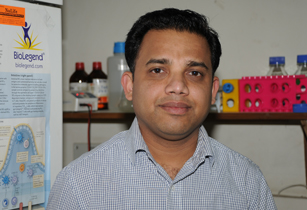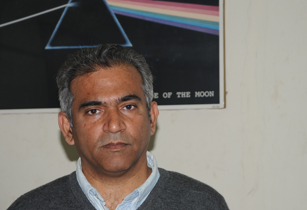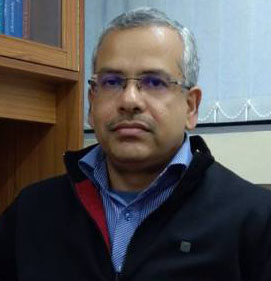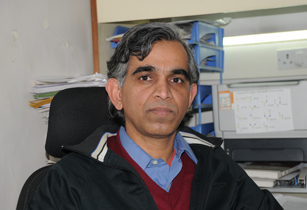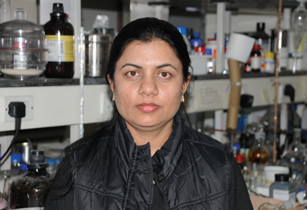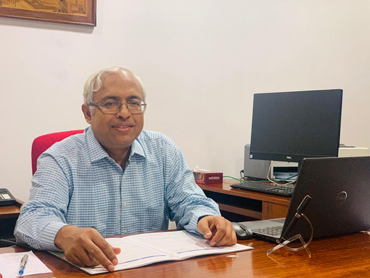Dr. Soumen Basak
In their anatomic niche, mammalian cells receive signals from a variety of stimuli that generate crosstalks between signal-activated intracellular pathways. Combining biochemistry, genetics, and computational modeling tools, we have been investigating the role of these cross-regulatory mechanisms in physiology and disease. We are examining crosstalk between the canonical and non-canonical NF-κB pathways and those beyond NF-κB signaling. We are biochemically characterizing crosstalk mechanisms integrating cellular pathways within a network and exploring if such crosstalks have functional relevance for I). inflammation and inflammation-associated ailments, including cancer, or II). for anti-viral immunity.
We argue that our crosstalk studies may inform improved therapeutic regimes, which specifically target signaling crosstalk, in the future.
A multitude of biochemical processes links the intracellular signaling pathways in a network. This interlinked signaling network, and not the individual pathways,
eventually shapes cellular responses. Because of the complexity of the signaling network, assigning specific interactions between signaling modules to distinct immune functions has remained challenging. Implementing a systems biology-based approach, we are exploring the crosstalk between these “dedicated” signaling pathways and understanding the implications of such interdependent regulations in physiology and pathophysiology. In particular, we are exploring if such crosstalks have functional relevance for:
i) inflammation and inflammation-associated ailments, and ii) for anti-viral immunity.
I. Inflammation and Inflammation-associated diseases: Microbial substances engage the canonical RelA NF-κB pathway, which triggers the expression of dozens of pro-inflammatory cytokines and chemokines. While controlled canonical signaling is important for physiological inflammatory innate immune responses, excessive RelA activity leads to inflammatory ailments. Importantly, a seemingly separate non-canonical RelB NF-κB pathway mediates the development and maturation of secondary lymphoid organs organs and lymphocytes. In this program, we are specifically testing if crosstalk between these NF-κB pathways and those involving Wnt-β-catenin
signaling act as an inflammation-tuning immunoregulatory mechanism. We are also investigating if aberrant pathway crosstalk causes inflammatory diseases, particularly inflammatory bowel diseases (IBD) and colorectal cancer (CAC). In a systems-modeling approach, we are combining in silico studies involving a computational model trained to capture inflammatory signaling dynamics and ex vivo biochemical analyses involving a panel of knockout cells devoid of the expression of one or the other
signaling proteins to understand crosstalk regulations of inflammatory responses. Mechanistic insights from such studies are then substantiated in vivo in mouse models of IBD and CAC involving cell-type specific knockout mice. Our systems-based approach not only promises new mechanistic insights into the dynamic control of inflammatory responses but also bears promises for disease-specific interventions in inflammation-associated diseases that target cross regulatory signaling mechanisms.
II. Antiviral immune responses: Besides canonical RelA NF-κB signaling, viral infections also trigger the IRF3 signaling axis. In particular, RelA plays two important antiviral functions. First, RelA-driven expression of cytokines and chemokines instructs CD8+ T cell engagement during viral pathogenesis. In collaboration with IRF3, RelA also activates genes encoding type-1 interferons, a family of antiviral mediators. However, by inducing pro-survival gene expressions, RelA extends the life span of virus-infected cells, supporting overall viral yield. On the other hand, the non-canonical RelB NF-κB pathway downmodulates type-1 interferon responses elicited by infected cells while restricting virus propagation in vivo by virtue of its ability to orchestrate secondary lymph node functions. In this program, we are addressing how these often-opposing roles of intracellular pathways interface in defining antiviral immunity. In particular, we are focusing on two important viruses of human health relevance – namely, Chandipura virus, a virus often associated with encephalitis outbreaks in India, and Chikungunya virus, a continuing global threat, particularly in the context of climate change. Combining ex vivo cell signaling studies and mouse models for viral infection, we are addressing how cell-signaling crosstalks impact viral pathogenesis. We hope that our study will inform novel antiviral therapies in the future.
Naveen Kumar, SK Asif Ali, Swapnava Basu, Sanchi Arora, Ashish K. Mishra, Deepakshi Sahu (PhD Students); Shreya Singh (i3c-BRIC PhD student); Bhawna (Joint PhD Student, NII-IITD); Dr Debasish Kumar Dey (MK Bhan Young Researcher Fellow); Birendra Kumar and Vijendra Kumar (Technical Staff)
Awards:
•2023: Incorporated as a member of the Society of Inflammation Research, India
•2022: Elected as a Fellow of the Indian National Science Academy (INSA, New Delhi)
•2021: Elected Fellow of the Indian Academy of Sciences (IASc, Bangalore)
•2021: Elected Fellow of the National Academy of Sciences India (NASI, Prayagraj)
•2019: Shanti Swarup Bhatnagar Award for Research Excellence in Biological Sciences
•2018: Received the National Bioscience Award for Career Development in recognition of the research in the area of immunology and cell signaling
•2017: Elected as a member of the Guha Research Conference
•2010-2015: Intermediate Fellow, Wellcome Trust-DBT India Alliance
•2003: Young Scientist Award from the Indian Science Congress Association (ISCA)
Collaborators:
Abhyudai Singh, Univ. of Delaware; Guruprasad R. Medigeshi, Amit Awasthi and Bhabatosh Das – all from THSTI-Faridabad; James Gomes, Manidipa Banerjee and Tapan Nayak from IIT- Delhi; Vineet Ahuja and Subrata Sinha from AIIMS; Shilpak Chatterjee from IICB- Kolkata; Debarka Sengupta, IIIT-D; Rajesh Gokhale, IISER-Pune.
- Alvina Deka, Naveen Kumar, Swapnava Basu, Meenakshi Chawla, Namrata Bhattacharya, Sk Asif Ali, Bhawna, Upasna Madan, Shakti Kumar, Bhabatosh Das, Debarka Sengupta, Amit Awasthi, Soumen Basak# Non-canonical NF-κB signaling limits the tolerogenic β-catenin-Raldh2 axis in gut dendritic cells to exacerbate intestinal pathologies. EMBO J. 2024 Sep;43(18):3895-3915. doi: 10.1038/s44318-024-00182-6. Epub 2024 Jul 25.
- Jyotsna, Binayak Sarkar, Mohit Yadav, Alvina Deka, Manasvini Markandey, Priyadarshini Sanyal, Perumal Nagarajan, Nilesh Gaikward, Vineet Ahuja, Debasisa Mohanty, Soumen Basak, Rajesh S Gokhale# A hepatocyte-specific transcriptional program driven by Rela and Stat3 exacerbates experimental colitis in mice by modulating bile synthesis. Elife. 2024 Aug 13;12:RP93273. doi: 10.7554/eLife.93273.
- Md Tipu Khan, Mariyam Almas, Nargis Malik, Akansha Jalota, Shaifali Sharma, Sk Asif Ali, Kalpana Luthra, Vaishali Suri, Ashish Suri, Soumen Basak, Pankaj Seth, Kunzang Chosdol, Subrata Sinha#. STAT1 mediated downregulation of the tumor suppressor gene PDCD4, is driven by the atypical cadherin FAT1, in glioblastoma. Cell Signal. 2024 Jul;119:111178. doi: 10.1016/j.cellsig.2024.111178. Epub 2024 Apr 18.
- Tapas Mukherjee, Naveen Kumar, Meenakshi Chawla, Dana J. Philpott, Soumen Basak# The NF-κB signaling system in the immunopathogenesis of inflammatory bowel disease. Sci Signal. 2024 Jan 9;17(818): eadh1641. doi: 10.1126/scisignal.adh1641. Epub 2024 Jan 9.
- Yashika Ratra, Naveen Kumar, Manti K Saha, Chandrima Bharadwaj, Chen Chongtham, Sachendra S Bais, Guruprasad Medigeshi, Gopalakrishnan A Arimbasseri, Soumen Basak# A Vitamin D-RelB/NF-kB Pathway Limits Chandipura Virus Multiplication by Rewiring the Homeostatic State of Autoregulatory Type 1 IFN-IRF7. Journal of Immunol. 2022 Jul 18; doi: 10.4049/jimmunol.2101054.
- Meenakshi Chawla, Tapas Mukherjee, Alvina Deka, Budhaditya Chatterjee, Uday Aditya Sarkar, Amit K. Singh, Saurabh Kedia, Josephine Lum, Manprit Kaur, Balaji Banoth, Subhra K Biswas, Vineet Ahuja, Soumen Basak# An epithelial Nfkb2 pathway exacerbates intestinal inflammation by supplementing latent RelA dimers to the canonical NF-kB module., Proceedings of the National Academy of Sciences USA. 2021 Jun 22;118(25).
- Meenakshi Chawla, Payel Roy, Soumen Basak# Role of the NF-kB system in context-specific tuning of the inflammatory gene response. #corresponding author, Current Opinion in Immunology, 68:21-27, Sep 2020.
- Bais SS, Ratra Y, Khan NA, Pandey R, Kushawaha PK, Tomar S, Medigeshi G, Singh A, Basak S# Chandipura virus utilizes the pro-survival function of RelA NF-kB for its propagation. #corresponding author, Journal of Virology. 2019 Jun 28; 93(14).
- Tapas Mukherjee, Budhadittya Chatterjee, Atika Dhar, Sachendra S. Bais, Meenakshi Chawla, Payel Roy, Anna George, Vineeta Bal, Satyajit Rath, Soumen Basak# A TNF-p100 pathway subverts LTβR-mediated noncanonical NF-kB signaling and restricts naïve lymphocyte ingress in inflamed secondary lymphoid organs. # corresponding author, EMBO J. 2017 Dec 1;36(23):3501-3516.
- Also see https://scholar.google.co.in/citations?user=yTLQ-KoAAAAJ&hl=en




